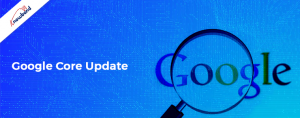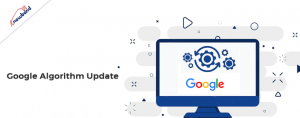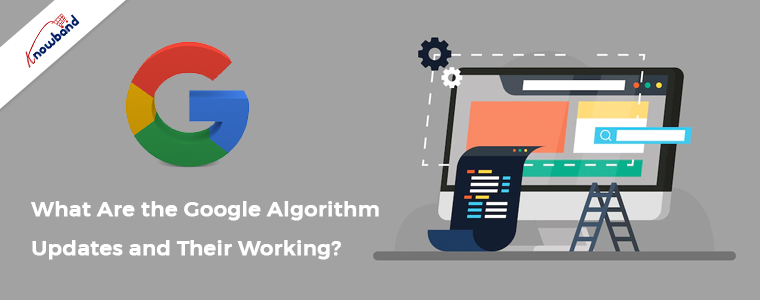Google makes multiple changes to its algorithm every year. Additionally, most of these Google algorithm adjustments are minor and barely perceptible, but at least once per year, a significant update takes place that changes how websites are ranked and shown on the SERPs (search engine results pages). Additionally, we’ll discuss a couple of Google algorithm updates that have significantly impacted search in the past or that are still important to keep in mind now. In our essay, we’ll go over these Google algorithm improvements.

A change to Google’s algorithms is referred to as a “core update.” Additionally, it is a core charge whenever a significant transition or series of changes takes place. This suggests that the algorithm will alter in a significant way. Furthermore, there will be a considerable negative influence on SEO.
Updated Google Algorithm

An algorithm update is a change to the way Google ranks websites in search results. Additionally, these adjustments could be subtle and imperceptible or they could be substantial and immediately affect your rankings.
Search Engine Update

One type of Google algorithm change that significantly affects search results is a core update. Furthermore, these are significant algorithm adjustments that could have an impact on a wide variety of websites and platforms. A Google core algorithm update might either have positive or negative effects on your website. Furthermore, whether or not you have a dedicated team of Search Engine Optimizers (SEOs) won’t change this.
The impact of Google algorithm modifications must be understood. A page or pages on your website could therefore lose their indexing status and stop showing up in search engine results pages (SERPs). Unnatural links or duplicate content cause this to occur. Additionally, this usually results in a rapid reduction in organic traffic to your website. A few key changes to the search algorithm are as follows:
Penguin
Google Penguin specifically targeted websites with spammy link profiles. Additionally, if your site has links going to domains with less authority or trust, the Penguin penalty will be applied to it. Additionally, there is a penalty if artificial links, keyword stuffing, over-optimization, or link schemes were employed. The Backlinks Report allows users to monitor changes over time. It is straightforward to locate site-wide linkages with Google Webmaster Tools. If you have several connections from your website or another that seem out of place, you should also reevaluate your linking strategy. Additionally, Google Search Console or Webmaster Tools will let you know whether any Google algorithm changes have already had an impact on you.
Panda
The first substantial change to the Google algorithm was introduced in February 2011 with the release of Panda. Furthermore, a primary objective of the update was to de-scale the website by emphasising content quality scores for webpages and removing thin, spammy, or low-quality content. Online pages had a “quality score” prior to Google Panda. This score determines how websites are ranked. Panda was once just a filter and not a crucial element of Google’s ranking system. But it was formally designated as the main algorithm in January 2016.
Panda focuses a number of concerns, including duplicate content, plagiarism, user-generated spam, poor user experience, and keyword stuffing. Additionally, penalties were being applied at the time the Panda update was scheduled to go live. Utilize the site crawler to look for duplicate content, thin content, and keyword density to prevent Google penalties. Tools for both plagiarism detection and website auditing are available.
Adaptability to Mobile
In 2015, Google released one of the biggest algorithmic updates. Webmasters and SEOs had a two-month warning this time around thanks to a Google Webmaster Blog update from February 2015.
The “Mobilegeddon” update or Smartphone-friendly Ranking Factor Update was Google’s response to the increase in mobile searches. Google is now required to take a site’s mobile friendliness into account. Additionally, flash-using websites as well as those with text that is too small or close to the edge were being penalized.
Additionally, clickable resources or components that didn’t adapt to different screen widths were being penalized. Additionally, responsive and mobile-friendly websites were prioritized in search results. This still applies to the rankings as of right now.
Updated Mobile Page Speed
Google said in January 2018 that the algorithm would undergo a “speed update” that would include new ranking factors. Additionally, when conducting a mobile search, this would prefer pages with quick mobile page loading times.
Google declared that data from the Chrome User Experience Report would now be included in Page Speed Insights. Additionally, developers and website owners should take these loading metrics into account when assessing fast mobile speed. Additionally, it is helpful to get a more true picture of what actual users will experience when loading on mobile devices. Two of the most important indicators of a fast-loading experience were to be DOM Content Loaded (DCL) and First Contentful Paint (FCP).
Mobile search results were taken into account when ranking pages as a result of the increase to mobile page speed. Websites with incredibly quick mobile pages saw an improvement in search engine rankings, whereas those with slower speeds saw a decline. The SEO team must work with programmers or developers to address the issue of mobile speed.
Hummingbird
The Hummingbird Google algorithm improvements have a huge impact on the experience using search engines. This update has also improved Google’s understanding of what we refer to as “search intent.” It allowed the search engine to more accurately offer user questions and information by connecting user searches with website information. Users can more easily find the sites that will answer their questions thanks to the Hummingbird upgrade. This encourages the search community to investigate the search intent underlying particular terms in greater detail and make an effort to optimize it.
RankBrain
Hummingbird uses RankBrain machine learning technology to comprehend search intent. It was able to offer an extra layer of personalization to search results following RankBrain by using a user’s search history, implied phrases, and context to deliver more results to a searcher. Additionally, the worst-affected pages lacked background information or did not use context-relevant language. to ascertain which words were used on the pages and how frequently. SEOs and webmasters started using tools for the pages that were landing in the desired position in search engine results. Additionally, Google performed the RankBrain upgrade by adjusting its interpretation of search intent in light of the language and individual search histories.
Bert
The biggest algorithm modification, known as Bert, was released to make it easier to understand search engine requests. Additionally, Google claims that this change had an impact on both featured snippets and search ranks. This version focuses on the deep learning technique for processing natural language. Additionally, it supports machine learning by imparting to it the whole nuanced meaning of the word in the phrase’s context. Knowing the sentence’s context can help you understand the search query better and prevent you from seeing any irrelevant results. If you want to stay safe, you should also keep optimizing any images or videos that you publish on your website along with your articles.
Medic
Expertise, authorities, and trustworthiness (EAT) in internet content could be more easily determined with the Medic update. We also know that a variety of factors influence EAT. Additionally, if your website had few reviews and backlinks at the time of this upgrade, it would have been ranked lower. If the website has minimal material, isn’t updated frequently, or lacks in-depth company profiles, the ranking will be lower. It’s likely that this website was demoted in search results in favor of links that satisfied more of these requirements.
After all,
The various significant Google algorithm updates have been covered. If any of our plugins catch your attention, you may contact us at susupport@knwband.com. Additionally, we support custom developments based on your company’s requirements. Additionally, we will assist you if you wish to customize our module by, for example, adding a functionality. You can get in touch with us, and we’ll be pleased to address any problems.


